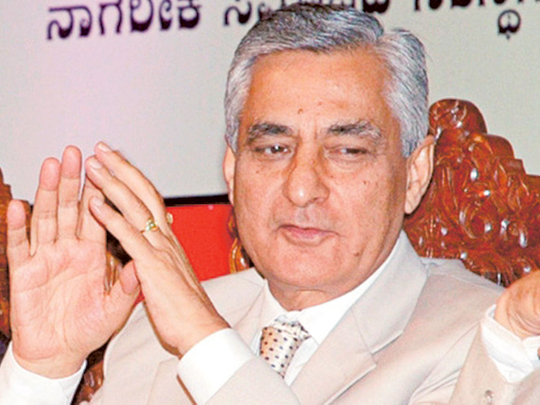
Mumbai: Ashish Kumar last saw his brother Vinod when he was being driven away by a senior police officer in Ludhiana, in northern India.
Vinod’s body was never found but the CBI, India’s intelligence agency believes that the officer, Sumedh Singh Saini, was responsible for his death.
They filed murder charges against him within a month.
That was in 1994.
Twenty-two years have passed since the murder case began. Only three of 36 witnesses have been heard so far. Four witnesses have already died without being presented in court.
At 94 years old, Vinod’s mother Amar Kaur can’t hear or speak well. She doesn’t seem to understand much about life at present. But when she hears her son’s name, she yells at the top of her voice, “Insaaf!” “Justice”.
Kaur, who used to go to court in a stretcher, gave her testimony in her son’s murder case when she was aged 86, 14 years after he went missing.
She asked the court several times to hear her statement sooner, fearing that she didn’t have long to live. When she was finally heard, the judge had to step down from the podium and stand next to the witness box to be able to hear her thin, fading voice. But before she could finish, he decided to break for lunch. The next available date for her to deliver her statement was a month later.
In the time that has passed since Vinod disappeared, Saini has continued in his role and was promoted to Director General of Police in Punjab. He still has charges hanging over him.
Vinod’s family on the other hand, has had to leave their family home, give up their business, and move to Delhi. They claim to have been threatened on numerous occasions and moved in order to remain safe and follow the case.
Vinod’s murder case is not exceptional in India.
More than 22 million cases are currently pending in India’s district courts. Six million of those have lasted longer than five years. Another 4.5 million are waiting to be heard in the high courts and more than 60,000 in the supreme court, according to the most recently available government data. These figures are increasing according to decennial reports.
Last week, Chief Justice of India’s supreme court, Tirath Singh Thakur broke down while addressing the Prime Minister Narendra Modi, blaming the government for inaction over judicial delays, particularly for failing to appoint enough judges to deal with the huge backlog of pending cases.
In the government’s budget for 2016, only 0.2 per cent of the total budget was given to the Law Ministry, one of the lowest in the world.
There is a systematic problem with India’s courts,” Vinod’s younger brother Ashish says. “And because of it our family has suffered so much.”
The number of cases, however, is only a part of the problem. Take a walk through any court building in India and you’ll see long queues of people waiting outside courtrooms without any guarantee of getting a complete hearing.
India has one of the world’s lowest judges to population ratios in the world, with only 13 judges per million people, compared to 50 in developed nations. As a result, judges hear scores of cases every day, which leads to a large number of adjournments, multiple judges passing cases between them, and increasingly long queues of people waiting outside courtrooms on the off chance that their case is heard.
“Judges are under enormous pressure,” justice Mukul Mudgal, a former high court judge, says. “You have around 30 or 40 cases every day, and usually, you spend an hour before court reading the files. I used to do half of them the previous night. It’s a lot of work, and it is chimerical to hope that any judge will read every page of every case he’s dealing with.”
Judges are paid little compared to lawyers, which has led to a steady decline in the quality of judges.
To add to the burden, lawyers frequently use delaying tactics such as appealing verdicts endlessly, or saying they’re sick or failing to show up to court.
“Adjournments are given freely, witnesses don’t come on time, and there’s nobody looking at judicial administration,” explains Harish Narsappa, whose think tank Daksh analyses data on judicial delays.
“If you go to court and ask the judge for an adjournment, the judge will ask OK, what day do you want? At that time, neither the judge nor the lawyer has any clue what the judge’s capacity is for that day next week. What’s the point of saying I’ll hear you on this day next week, if he just doesn’t have the time?”
Narsappa estimates that the delays cost India’s economy trillions of rupees every year.
Meanwhile, the impunity that criminals may enjoy because of how slowly the legal system operates, is exemplified by India’s elected politicians. One of every three politicians currently sitting in the Indian parliament have criminal records, with the vast majority of those involved in serious cases such as rape, murder, or kidnapping.
Prasanna explains that even the most basic needs of the courts are not met. “Some courts are having to hold sessions in the dark because there’s no electricity. Old buildings need to be maintained. People need to be trained better, even when computers are provided people are not trained to use them.”
Dave believes that the judicial system is in dire need of a complete overhaul. Laws need rewriting. Judicial process needs to be streamlined. Lawyers need to be penalised for delaying matters without reason. “The government is not interested,” he says. “No politician or bureaucrat wants a strong judiciary.”
Justice Mudgal agrees, but doesn’t believe the changes needed to strengthen the judiciary will come in his lifetime.
In the meantime, Ashish Kumar will keep fighting for his brother. “I believe in this country, and I believe I will get justice one day,” he says. “My brother was a great man,” Ashish says. “That’s why I’ve spent my entire life trying to get justice for my brother. The rest is up to God”











